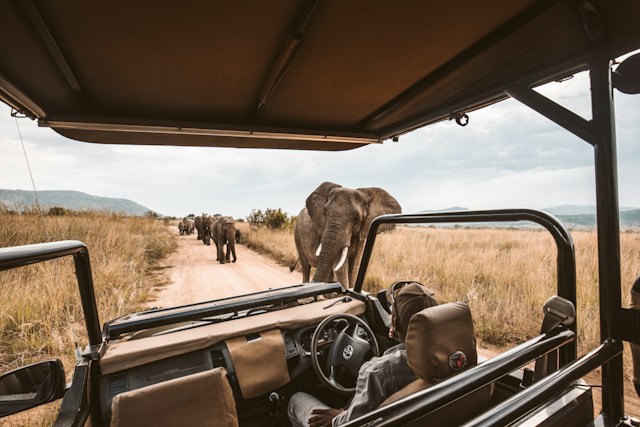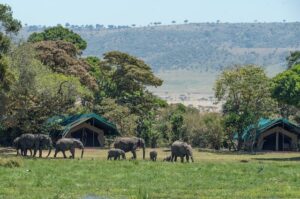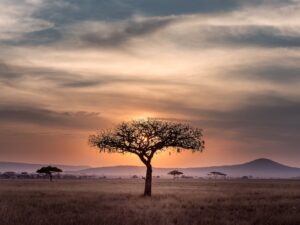
Eco-Friendly Safaris: Sustainable Practices for Environmentally Conscious Travellers
Posted on November 29, 2023
Planning a family safari is an exciting endeavor, offering a unique opportunity to bond with loved ones while experiencing the beauty of the African wilderness. However, as eco-conscious travelers, you must consider the environmental impact of your journey. Eco-friendly safaris provide the perfect solution, allowing you and your family to immerse yourselves in nature without compromising the health of our planet. This guide highlights ten sustainable practices that enhance your experience and contribute positively to the environment and local communities.
No. 1 Choosing Responsible Safari Operators
Choosing the right safari operator is crucial for an eco-friendly adventure, and Denhum Holidays is an excellent example. Operators like this are often certified by organizations such as the Global Sustainable Tourism Council, affirming their commitment to environmental responsibility. That means they adhere to strict sustainability guidelines that cover various aspects of their operations. For instance, they usually hire local staff to support the community economically. In addition, they typically use renewable energy sources, like solar power, to reduce carbon emissions. Plus, they actively participate in wildlife conservation efforts, ensuring the protection and preservation of the animals and their habitats. Opting for such a certified and conscientious operator ensures your safari adventure aligns with ecological and ethical standards.
No. 2 opt for Eco-Friendly Safaris and Accommodations
Eco-lodges and tented camps represent the essence of eco-friendly accommodations. They are specially designed to minimize environmental impact while providing comfort. These accommodations typically harness solar energy for power, meaning they rely less on fossil fuels and reduce carbon emissions. They also incorporate water-saving measures, like rainwater harvesting and low-flow fixtures, to conserve this precious resource. At the same time, their construction often involves sustainable materials that blend seamlessly with the natural surroundings, reducing habitat disruption. A prime example is ‘Serengeti Green Camp,’ which utilizes an advanced solar system to power its operations.

Eco-friendly safaris should be combined with eco-friendly accommodations.
No. 3 Participate in Conservation Activities
Safari operators increasingly incorporate conservation activities into their itineraries, offering guests a more hands-on and meaningful experience. These activities include:
- Wildlife tracking, where guests can learn to follow and identify animal tracks, contributes to research and monitoring efforts.
- Tree planting is another great option, as it helps in habitat restoration.
- Educational workshops are also common, providing insights into local ecosystems and conservation challenges.
A notable example is in Kenya, where guests can participate in guided rhino monitoring walks. This activity educates them about rhinos and their plight. However, it also directly contributes to conservation efforts by tracking and monitoring these endangered animals.

Participate in eco-friendly safaris and activities, like tree planting.
No. 4 Practice Responsible Wildlife Viewing
Responsible wildlife viewing emphasizes observing animals in their natural environment without causing them harm or disturbance. Specifically, it involves maintaining a safe distance to avoid altering their normal activities and avoiding any interference with their natural habitats. Wildlife guides play a key role in this process. They are trained to understand and recognize signs of animal stress or discomfort. By doing so, they can determine the appropriate times to retreat, thereby promoting a harmonious and respectful relationship between humans and wildlife. This approach protects the animals and ensures a more authentic and ethical wildlife viewing experience.
No. 5 Use Environmentally Friendly Transportation
Eco-friendly safaris are focused on minimizing environmental impact, particularly through reducing carbon emissions. That can be achieved through various approaches. For instance, some safaris are conducted on foot, eliminating vehicle emissions. Others utilize vehicles that run on clean energy sources instead of fossil fuels. So, look for an operator that uses electric vehicles. They are silent, thus reducing noise pollution and disturbance to wildlife. At the same time, they are emission-free, significantly cutting down the carbon footprint typically associated with safari tours.
No. 6 Support Local Communities is a key component to eco-friendly safaris.
Supporting local communities is a fundamental aspect of sustainable tourism. For example, you can achieve this by purchasing local handicrafts, eating at local establishments, or taking part in cultural tours. Visiting a Maasai village, for instance, allows travellers to immerse themselves in local culture while their spending supports the community economically.
No. 7 Minimize Waste and Recycle
Minimizing waste is crucial on safaris. Travellers should avoid single-use plastics and carry reusable items like water bottles and shopping bags. So, keep this in mind when packing for a safari. In addition, many eco-friendly camps have established waste management systems, offering water refill stations and recycling facilities. That helps in significantly reducing the waste that pollutes the natural environment.

Using reusable water bottles to minimize waste is key while doing eco-friendly safaris.
No. 8 Educate Yourself and Others
Education plays a vital role in sustainable travel. Travellers can make informed decisions that benefit the environment by learning about the local ecosystems, wildlife, and cultural practices. Also, safari operators often organize workshops and talks where experts share insights about local conservation efforts. That provides a deeper understanding of the region’s ecological and cultural significance.
No. 9 Offset Your Carbon Footprint
Carbon offsetting is a great solution to compensate for the emissions caused by travel. For example, you can do this by investing in projects that reduce carbon emissions, like reforestation or renewable energy initiatives. Also, many travel agencies and airlines offer options to calculate and offset the carbon footprint of your journey. As a result, it will be easier for you to contribute to these vital efforts.
No. 10 Minimizing Home Energy Consumption During Extended Travels
Embarking on a longer safari often means leaving your home unoccupied, presenting a unique opportunity to minimize energy consumption. According to Professional Movers Ottawa, an innovative approach to achieving this is through renting storage for your personal belongings. By moving items, you won’t need during your travels into storage, you can significantly downsize your living space or even sublet your home. This reduction minimizes the energy required for heating, cooling, and maintaining an empty house.
Also, in preparation for your trip, you should thoroughly audit your home’s energy usage. Unplug all non-essential appliances, switch to energy-efficient LED lighting, and consider installing a smart thermostat to regulate temperature efficiently in your absence. These steps ensure that your home’s energy consumption is significantly reduced while you’re enjoying your safari.
Final Thoughts on Eco-Friendly Safaris
Eco-friendly safaris represent more than just an opportunity to witness Africa’s majestic wildlife and landscapes. They are a commitment to preserving these wonders for future generations. Note that every small step towards sustainability on your safari journey counts, creating a meaningful and impactful adventure that resonates with the ethos of responsible travel.


Comments are currently closed.